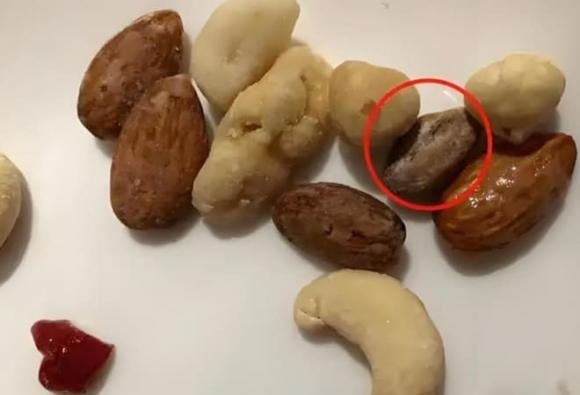1. Moldy Fruits
Fruits are an excellent source of essential vitamins and nutrients for our bodies. However, they are susceptible to mold when exposed to temperature and humidity changes.
While it is common to cut off the moldy parts and consume the remaining fruit, this practice poses significant health risks. Moldy fruits can produce toxic substances such as mycotoxins and nitrites, which can be extremely harmful if ingested.
2. Bitter Nuts
Nuts like almonds, cashews, and peanuts are typically rich in beneficial proteins and fats. However, when stored for prolonged periods or improperly, they can turn bitter and astringent. This change in taste is not merely a matter of preference but also a warning sign.
Bitter nuts may have formed aflatoxin, a potent toxin associated with cancer and considered more toxic than arsenic. Even consuming a small amount can lead to liver damage and long-term health issues.

3. Runny Eggs
Runny eggs are a delicacy for many due to their creamy texture and rich flavor. However, undercooked eggs may harbor Salmonella bacteria, which can cause food poisoning.
Salmonella infection can lead to abdominal pain, nausea, diarrhea, and fever. Therefore, it is crucial, especially for children, the elderly, and immunocompromised individuals, to ensure that eggs are thoroughly cooked before consumption.
4. Over-soaked Mushrooms
Dried mushrooms, such as wood ear or cloud ear fungi, are common ingredients in various dishes. However, soaking them for too long can be detrimental to your health.
Prolonged soaking can cause the mushrooms to produce fumonisin, a toxin harmful to the liver and kidneys, leading to food poisoning. It is advisable to soak dried mushrooms for the recommended duration and use them promptly after they have softened.
5. Bitter-tasting Fruits
(Excluding bitter melon) Fresh fruits and vegetables typically offer a sweet or refreshing taste. However, when stored for extended periods or improperly, they can develop a bitter flavor.
Contrary to the belief that bitter fruits are good for the liver, this bitterness may be due to cucurbitacin, a heat-stable toxin. Consuming cucurbitacin can lead to food poisoning, causing abdominal pain, nausea, and diarrhea.
6. Sprouted Potatoes
Potatoes are generally easy to store, but when kept for too long or in damp and bright conditions, they may sprout. Both the sprouts and the green-colored skin contain solanine, a toxic compound.

Note: Always inspect your food for any unusual signs in taste, smell, or appearance. Your health and your family’s well-being are paramount, so never compromise when it comes to food safety.































